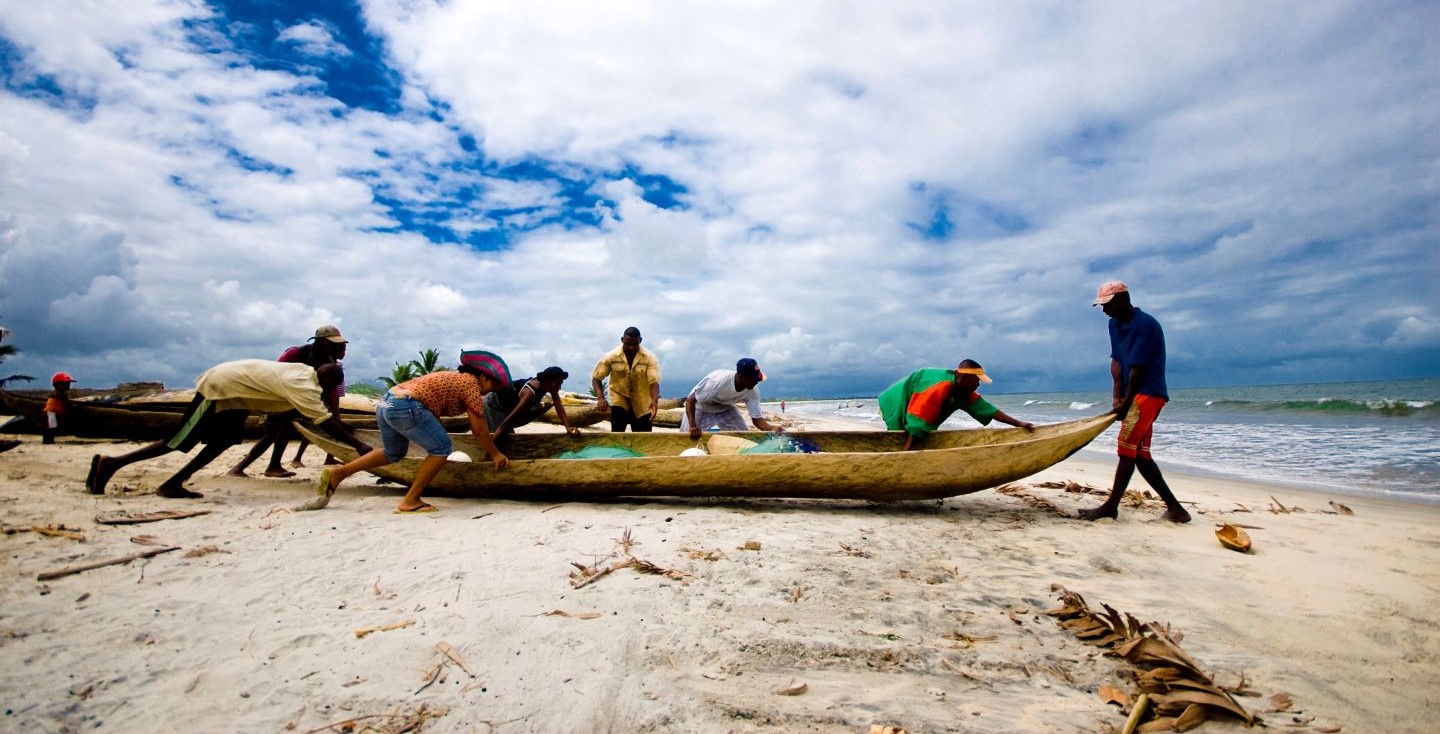Managing fisheries for sustainability and resilience: The case of Angola
IFAD Asset Request Portlet
Publicador de contenidos
Managing fisheries for sustainability and resilience: The case of Angola
Por Richard Abila

Fish is a major source of animal protein for about 3.2 billion people worldwide, and is also an important source of micronutrients. The fisheries and aquaculture sectors fully or partially support the livelihoods of 10–12 per cent of the world’s population. Yet fisheries across the world are under threat from climate change and over-exploitation.
The question of how best to manage fisheries under these conditions is a complex one, but in our experience, bringing communities into inclusive governance structures is an indispensable part of the solution. The small-scale fishers and processors who make up these communities are highly attuned to local conditions, which makes them well positioned to sustainably manage natural resources and restore the ecosystems in which they live and work.
Setting up a community-based fisheries management system comes with many challenges. But with the right support, a community’s everyday activities can become opportunities to build food, nutrition and income security that extend beyond their borders. This is what we observed in Angola through the rollout of our AFAP project.
Inclusive fisheries management comes to Angola’s inland lakes
Fish is an important part of nutritious diets in Angola, where two-thirds of the population live below the poverty line. The fisheries sector is also a key income stream for women, who are typically responsible for processing and selling.
The lakes surrounding Angola’s Kwanza River are a key source of the nation’s fish. Nevertheless, they are significantly over-exploited. Many local fishers use unsustainable practices, such as using small-meshed nets that catch young fish who have yet to reproduce. In the long run, this makes fish populations fall, affecting local livelihoods as well as the nutrition available to urban consumers. The area also suffers from deforestation, which, along with the effects of climate change, contributes to worsening floods and erosion.
To tackle these challenges, the AFAP project helped local fishers organize into committees. Some groups were trained on surveillance and data collection, and began monitoring and recording catches. Others began replanting trees around villages, and still others stood guard against tree felling and litter dumping around the lakes. The project also provided sustainable fishing nets to replace the small-mesh nets.
Fish stocks are now recovering quickly, and overall community catches have increased to about 200,000 kilograms per month, improving livelihoods for 15,000 families. Participating fishers now avoid catching young fish. Tree planting has brought flooding and erosion under better control. And the reduction in litter means fewer clogs in channels, so that water now flows easily into the lakes when it rains.
Secure livelihoods and nutrition
Many African fishing communities depend heavily on fish for their own diets. But much of what they catch goes straight to market, and in the absence of access to other foods, they tend to have high rates of malnutrition. Moreover, without the right infrastructure for preserving fish, much of it is wasted. The fish available for their own consumption is therefore often of poor quality.
To help address this, AFAP piloted a small-scale aquaculture initiative, giving out kits for households to construct and stock their own ponds, and hosting trainings on environmentally sustainable production. The first harvest easily met the target of 550 kilograms of fish per pond. Some of this was consumed at home, while about 80 per cent was sold at a good market price of US$3.20 per kilogram. Meanwhile, participating women were able to improve their fish handling and preservation techniques, and post-harvest losses were reduced.
The project also encouraged households to establish community gardens growing a variety of nutritious vegetables, and to keep some ponds stocked with nutrient-rich fish specifically for community consumption. These “Nutriponds” have proved very popular, and their wide-scale adoption will help the poorest households achieve food security.
Localized solutions for resilience and adaptation
AFAP’s approach proved to be an environmentally sustainable way to increase fish supplies and diversify incomes while reducing food waste, enabling households to consume better quality fish, and grow or purchase other foods. It also presented us with opportunities to reflect on what worked well and what the approach taught us.
We found that, in areas used to receiving most decisions from the government, it takes time and effort for communities to understand and implement community-based management practices. To succeed, the process needs strong support and participation from traditional community leaders.
We also gained an appreciation for the breadth of difficulties facing community groups. For example, in remote areas without road infrastructure and telephone networks, it was difficult for community groups to move around and monitor fishing. Moreover, some of the environmental problems affecting water bodies were due to unsustainable farming and deforestation occurring upstream, where community groups had little influence. AFAP overcame many of these challenges by involving traditional leaders, raising community awareness, and providing boats and communication equipment.
As communities experience the benefits of this model, they will undoubtedly want to give full support to protect their livelihoods in the face of climate change and environmental degradation. For long-term sustainability, we also recommend that fishers should “pay in” a small levy from their catches to cover the community groups’ activities.
Over all, this project – and the fishers and processors who made it possible – demonstrates that, when communities are empowered with the knowledge, tools and governance structures to manage their fisheries sustainably, they are able to adapt to a changing climate and protect natural resources.
Learn more about IFAD’s work in Angola.
Fecha de publicación: 08 noviembre 2021